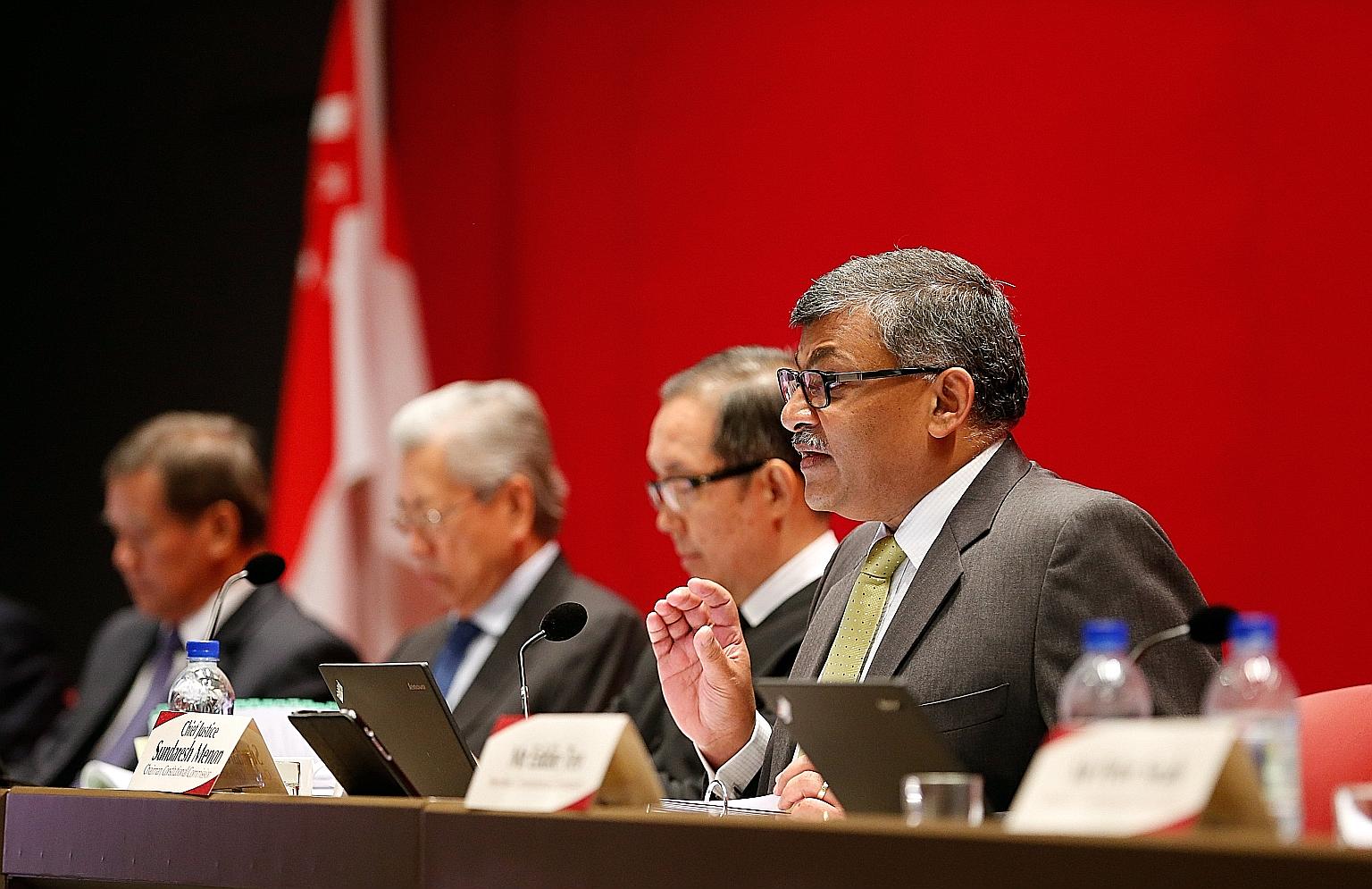Constitutional Commission hearing on elected presidency
'Minority-only contest would send wrong signal'
Three object to presidential poll restriction, say society should be left to evolve on its own
Sign up now: Get ST's newsletters delivered to your inbox

At the third hearing of the Constitutional Commission to review the Elected Presidency yesterday, CJ Menon asked if it would be possible to achieve the twin aims of letting society evolve and yet nudging it along, by having a provision to reserve elections for particular ethnic groups when they have not been represented in the office of president for a prolonged period of time.
ST PHOTO: CHEW SENG KIM
Follow topic:
Any move to occasionally restrict presidential polls to minority candidates would send the wrong signal that Singaporeans of minority races cannot be elected on their own merit, said three people yesterday at a hearing on the elected presidency.
Society is already moving towards race blindness in voting at elections, and should be left to evolve on its own, they added.
Institute of Policy Studies (IPS) deputy director of research Gillian Koh said: "We are in the process of working towards the idea that we should select someone for this office regardless of race, language or religion... If we stop this process now that would be a great pity."
Her view against having a legal provision to ensure a minority president is elected from time to time, was echoed by rights group Maruah and Singapore Management University law professor Jack Lee. They were speaking at the third hearing of the Constitutional Commission to review the elected presidency.
Chief Justice Sundaresh Menon, who chairs the commission, asked if it would be possible to achieve the twin aims of letting society evolve and yet nudging it along, by having a provision to reserve elections for particular ethnic groups when they have not been represented in the office of president for a prolonged period of time.
"The question is whether making any such a provision is going to hold us back or spur us on," he said.
Dr Koh, who had earlier submitted her views jointly with IPS research assistant Tan Min-Wei, warned it could result in minority presidents lacking gravitas and political legitimacy.
Citing a publication by Malay self-help group Mendaki, she said some in the community did not believe in affirmative action even if they aspire to have a Malay president. The last Malay president was Mr Yusof Ishak, who died in office in 1970.
But Public Service Commission chairman Eddie Teo, a member of the commission, said minority candidates too would be subject to the same stringent eligibility criteria applied to all candidates, and would have qualified based on merit.
Dr Koh said there would still be a perception problem.
CJ Menon noted that those who win elections in majoritarian systems are the most electable but not necessarily always the most meritorious candidates.
But there is no data, Dr Koh said, to show Singaporeans vote along racial lines at presidential elections, as the two polls that were contested, in 1993 and 2011, had only Chinese candidates.
She added that an IPS survey of over 2,000 Singaporean voters in 2011 found most were sanguine about a minority president being elected under the current system.
Later, Maruah president Braema Mathi said there are enough Singaporeans from minority groups who are qualified to stand and they just needed to be convinced to do so.
Dr Lee proposed that a committee be appointed to identify suitable minority candidates with the help of organisations such as civil society groups and unions, similar to how Nominated Members of Parliament are selected.
Ms Mathi questioned if the Government-led discussion had brought the issue of a minority president to the fore unnecessarily. She also said the commission should "watch the scene" for two or three more elections before deciding on any changes.
Professor Chan Heng Chee pointed out that countries that have avoided discussions on ethnicity have had to "scramble to address it in their own way'' as "the problem has come to hit them now".
In Singapore, the issue has been discussed all along, she noted.
Prof Chan, a commission member and chairman of the Lee Kuan Yew Centre for Innovative Cities at the Singapore University of Technology and Design, also said having minority presidents is a way of demonstrating inclusiveness, which is important in a multiracial society.
National University of Singapore law professors Jaclyn Neo and Swati Jhaveri suggested having a three- member council of presidents - with at least two members from different ethnicities - to achieve this.
They also proposed the institutions related to the presidency, such as the Council of Presidential Advisers, be required to have minority members. Dr Jhaveri said this is "part of a holistic view of safeguarding minority representation".
But CJ Menon asked if this would be "too interventionist".
It is important to have a minority president from time to time because of the president's special symbolic role, he said. But he questioned if there was a similar need in the institutions and cautioned against going down the path of entrenching group rights.

